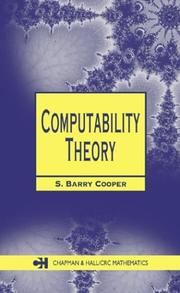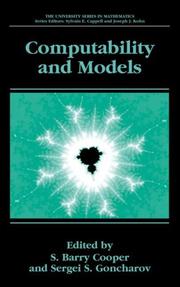| Listing 1 - 10 of 22 | << page >> |
Sort by
|

ISBN: 1584882379 Year: 2004 Publisher: London : Chapman and Hall,
Abstract | Keywords | Export | Availability | Bookmark
 Loading...
Loading...Choose an application
- Reference Manager
- EndNote
- RefWorks (Direct export to RefWorks)
Book
ISBN: 3319436694 3319436678 Year: 2017 Publisher: Cham : Springer International Publishing : Imprint: Springer,
Abstract | Keywords | Export | Availability | Bookmark
 Loading...
Loading...Choose an application
- Reference Manager
- EndNote
- RefWorks (Direct export to RefWorks)
This book questions the relevance of computation to the physical universe. Our theories deliver computational descriptions, but the gaps and discontinuities in our grasp suggest a need for continued discourse between researchers from different disciplines, and this book is unique in its focus on the mathematical theory of incomputability and its relevance for the real world. The core of the book consists of thirteen chapters in five parts on extended models of computation; the search for natural examples of incomputable objects; mind, matter, and computation; the nature of information, complexity, and randomness; and the mathematics of emergence and morphogenesis. This book will be of interest to researchers in the areas of theoretical computer science, mathematical logic, and philosophy.
Computer science. --- Computers. --- Computer science --- Mathematical logic. --- Computer Science. --- Theory of Computation. --- Mathematics of Computing. --- Mathematical Logic and Foundations. --- Mathematics. --- Computable functions. --- Unsolvability (Mathematical logic) --- Logic, Symbolic and mathematical. --- Algebra of logic --- Logic, Universal --- Mathematical logic --- Symbolic and mathematical logic --- Symbolic logic --- Degrees of unsolvability --- Turing degrees of unsolvability --- Computability theory --- Functions, Computable --- Partial recursive functions --- Recursive functions, Partial --- Constructive mathematics --- Decidability (Mathematical logic) --- Mathematics --- Algebra, Abstract --- Metamathematics --- Set theory --- Syllogism --- Recursive functions --- Information theory. --- Informatics --- Science --- Communication theory --- Communication --- Cybernetics --- Computer science—Mathematics. --- Automatic computers --- Automatic data processors --- Computer hardware --- Computing machines (Computers) --- Electronic brains --- Electronic calculating-machines --- Electronic computers --- Hardware, Computer --- Computer systems --- Machine theory --- Calculators --- Cyberspace

ISBN: 030647400X Year: 2003 Publisher: New York (N.Y.) : Kluwer academic/Plenum,
Abstract | Keywords | Export | Availability | Bookmark
 Loading...
Loading...Choose an application
- Reference Manager
- EndNote
- RefWorks (Direct export to RefWorks)
Digital
ISBN: 9783540730019 Year: 2007 Publisher: Berlin Heidelberg Springer-Verlag GmbH
Abstract | Keywords | Export | Availability | Bookmark
 Loading...
Loading...Choose an application
- Reference Manager
- EndNote
- RefWorks (Direct export to RefWorks)
Complex analysis --- Biomathematics. Biometry. Biostatistics --- Computer science --- Programming --- Information systems --- Computer. Automation --- toegepaste informatica --- complexe analyse (wiskunde) --- bio-informatica --- informatica --- biometrie --- systeemontwikkeling (informatica) --- wiskunde --- algoritmen --- methodologieën --- Europe
Digital
ISBN: 9780387685465 Year: 2008 Publisher: New York, NY Springer Science+Business Media, LLC
Abstract | Keywords | Export | Availability | Bookmark
 Loading...
Loading...Choose an application
- Reference Manager
- EndNote
- RefWorks (Direct export to RefWorks)
Philosophy --- Mathematical logic --- Mathematics --- Computer science --- Computer. Automation --- computergestuurd meten --- toegepaste informatica --- filosofie --- informatica --- wiskunde --- logica
Digital
ISBN: 9783642299520 Year: 2012 Publisher: Berlin, Heidelberg Springer Berlin Heidelberg
Abstract | Keywords | Export | Availability | Bookmark
 Loading...
Loading...Choose an application
- Reference Manager
- EndNote
- RefWorks (Direct export to RefWorks)
Mathematical logic --- Logic --- Complex analysis --- Computer science --- Information systems --- Computer. Automation --- toegepaste informatica --- cryptologie --- complexe analyse (wiskunde) --- informatica --- ontwerpen --- programmeren (informatica) --- wiskunde --- programmatielogica
Digital
ISBN: 9783642308703 Year: 2012 Publisher: Berlin, Heidelberg Springer Berlin Heidelberg
Abstract | Keywords | Export | Availability | Bookmark
 Loading...
Loading...Choose an application
- Reference Manager
- EndNote
- RefWorks (Direct export to RefWorks)
Mathematical logic --- Algebra --- Complex analysis --- Discrete mathematics --- Computer science --- Computer architecture. Operating systems --- algebra --- discrete wiskunde --- complexe analyse (wiskunde) --- informatica --- wiskunde
Digital
ISBN: 9783319436692 Year: 2017 Publisher: Cham Springer International Publishing
Abstract | Keywords | Export | Availability | Bookmark
 Loading...
Loading...Choose an application
- Reference Manager
- EndNote
- RefWorks (Direct export to RefWorks)
This book questions the relevance of computation to the physical universe. Our theories deliver computational descriptions, but the gaps and discontinuities in our grasp suggest a need for continued discourse between researchers from different disciplines, and this book is unique in its focus on the mathematical theory of incomputability and its relevance for the real world. The core of the book consists of thirteen chapters in five parts on extended models of computation; the search for natural examples of incomputable objects; mind, matter, and computation; the nature of information, complexity, and randomness; and the mathematics of emergence and morphogenesis. This book will be of interest to researchers in the areas of theoretical computer science, mathematical logic, and philosophy.
Mathematical logic --- Mathematical control systems --- Computer science --- Computer. Automation --- toegepaste informatica --- computers --- informatica --- wiskunde --- logica --- computerkunde --- informatietheorie
Book
ISBN: 3319060880 3319060899 Year: 2014 Publisher: Cham : Springer International Publishing : Imprint: Springer,
Abstract | Keywords | Export | Availability | Bookmark
 Loading...
Loading...Choose an application
- Reference Manager
- EndNote
- RefWorks (Direct export to RefWorks)
This book constitutes the refereed proceedings of the 11th Annual Conference on Theory and Applications of Models of Computation, TAMC 2014, held in Chennai, India, in April 2014. The 27 revised full papers presented were carefully reviewed and selected from 112 submissions. The papers explore the algorithmic foundations, computational methods, and computing devices to meet today's and tomorrow's challenges of complexity, scalability, and sustainability, with wide-ranging impacts on everything from the design of biological systems to the understanding of economic markets and social networks.
Computer science --- Mathematics --- Information theory. --- Computer science. --- Computer software. --- Logic design. --- Data structures (Computer scienc. --- Theory of Computation. --- Mathematics of Computing. --- Algorithm Analysis and Problem Complexity. --- Logics and Meanings of Programs. --- Data Structures and Information Theory. --- Mathematical Logic and Formal Languages. --- Design, Logic --- Design of logic systems --- Digital electronics --- Electronic circuit design --- Logic circuits --- Machine theory --- Switching theory --- Software, Computer --- Computer systems --- Informatics --- Science --- Communication theory --- Communication --- Cybernetics --- Data structures (Computer science) --- Information structures (Computer science) --- Structures, Data (Computer science) --- Structures, Information (Computer science) --- Electronic data processing --- File organization (Computer science) --- Abstract data types (Computer science) --- Computers. --- Computer science—Mathematics. --- Algorithms. --- Computer logic. --- Data structures (Computer science). --- Mathematical logic. --- Algebra of logic --- Logic, Universal --- Mathematical logic --- Symbolic and mathematical logic --- Symbolic logic --- Algebra, Abstract --- Metamathematics --- Set theory --- Syllogism --- Computer science logic --- Logic, Symbolic and mathematical --- Algorism --- Algebra --- Arithmetic --- Automatic computers --- Automatic data processors --- Computer hardware --- Computing machines (Computers) --- Electronic brains --- Electronic calculating-machines --- Electronic computers --- Hardware, Computer --- Calculators --- Cyberspace --- Foundations --- Machine theory. --- Computer Science Logic and Foundations of Programming. --- Formal Languages and Automata Theory. --- Abstract automata --- Abstract machines --- Automata --- Mathematical machine theory --- Algorithms --- Recursive functions --- Robotics
Book
ISBN: 9783540322665 Year: 2005 Publisher: Berlin Heidelberg Springer Berlin Heidelberg
Abstract | Keywords | Export | Availability | Bookmark
 Loading...
Loading...Choose an application
- Reference Manager
- EndNote
- RefWorks (Direct export to RefWorks)
CiE 2005: New Computational Paradigms http://www. illc. uva. nl/CiE/ ThecooperationComputabilityinEurope (CiE)isaninformalEuropeannetwork covering computability in theoretical computer science and mathematical logic, ranging from application of novel approaches to computation to set-theoretic analysesofin?nitarycomputingmodels. Thecooperationconsistsofelevenmain nodesandincludesover400researchers;itiscoordinatedfromLeeds(UK). More information about CiE can be found in Barry Cooper's introductory paper to this volume (p. 1) and at http://www. amsta. leeds. ac. uk/pure/staff/cooper/cie. html CiE 2005 was a conference on the special topic New Computational Pa- digms and was held in Amsterdam in June 2005. It was initiated by and served as a focus point for the informal cooperation CiE. The topic of New Com- tational Paradigms covers connections between computation and physical s- tems (e. g. , quantum computation, neural nets, molecular computation) but also higher mathematical models of computation (e. g. , in?nitary computation or real computation). Computability theory is central to large areas of theoretical computer science and mathematical logic. Traditionally, the computational model of the Turing machine (or mathematically equivalent models) has been used to reason about computation or computability. For general computability inquiries (with - bounded resources), the choice of the model of computation hardly matters (this fact is encapsulated in the so-called Church-Turing thesis ); this could change as soon as questions of e?ciency are investigated.
Computers. --- Algorithms. --- Computer science—Mathematics. --- Artificial intelligence. --- Bioinformatics. --- Theory of Computation. --- Algorithm Analysis and Problem Complexity. --- Mathematics of Computing. --- Artificial Intelligence. --- Bioinformatics. --- Algorithms.
| Listing 1 - 10 of 22 | << page >> |
Sort by
|

 Search
Search Feedback
Feedback About UniCat
About UniCat  Help
Help News
News